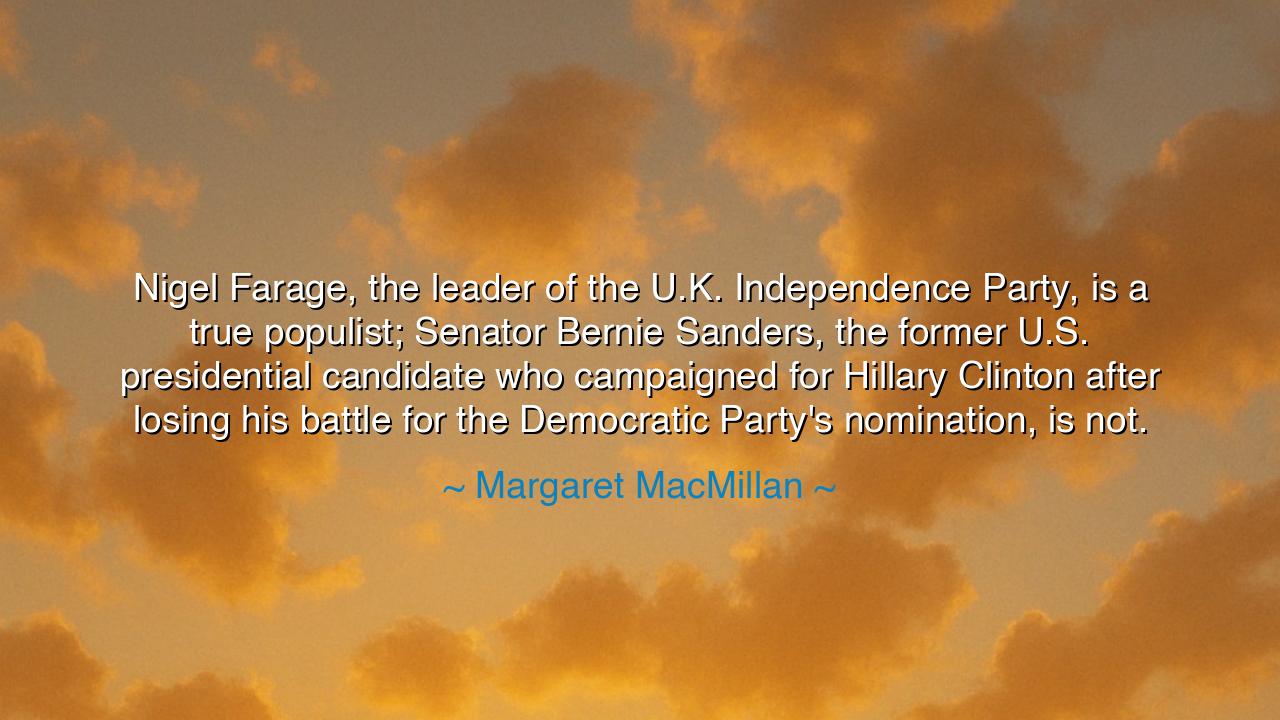
Nigel Farage, the leader of the U.K. Independence Party, is a
Nigel Farage, the leader of the U.K. Independence Party, is a true populist; Senator Bernie Sanders, the former U.S. presidential candidate who campaigned for Hillary Clinton after losing his battle for the Democratic Party's nomination, is not.






“Nigel Farage, the leader of the U.K. Independence Party, is a true populist; Senator Bernie Sanders, the former U.S. presidential candidate who campaigned for Hillary Clinton after losing his battle for the Democratic Party's nomination, is not.” Thus spoke Margaret MacMillan, historian and keeper of the lessons of power and people. Her words, though bound to the politics of our age, speak to a truth that has echoed through the centuries — that the populist and the idealist are not the same, and that the passions which move the masses can either uplift a nation or set it aflame. In this statement, MacMillan draws a line between two men of conviction, between two kinds of leadership: one that stirs the crowd through emotion, and one that seeks to guide through reason.
To understand her meaning, we must first know the world from which these words arise. The early years of the twenty-first century were a time of upheaval, when nations once united by purpose began to fracture under the weight of discontent. In Britain, Nigel Farage, leader of the U.K. Independence Party, rose as a voice of rebellion — not against tyranny, but against the distant governance of the European Union. His was a cry for sovereignty, for “taking back control,” a phrase that echoed like a drumbeat in the hearts of the disenchanted. His power lay not in policy, but in passion. He spoke the language of grievance, of the common man betrayed by elites. This, MacMillan reminds us, is the essence of true populism: it binds people not through shared ideals, but through shared anger and identity.
Across the sea, in the land of America, another figure rose — Bernie Sanders, a senator whose voice thundered against inequality and corporate greed. Like Farage, he drew crowds and stirred emotions, yet his heart burned for a different cause. Sanders sought to reform, not to destroy; to expand democracy, not retreat from it. His populism was tempered by principle, his rebellion bound by responsibility. And when he was defeated in his bid for the presidency, he did not tear down the temple of his party — he stood beside it, lending his support for the sake of unity. Thus, MacMillan distinguishes him: Sanders, though beloved by the people, did not cross into the realm of the populist, for he refused the intoxicating lure of division.
The ancients understood this difference well. In the twilight of the Roman Republic, two men embodied these same spirits: Julius Caesar and Cicero. Caesar, the populist, conquered hearts and lands alike; he gave the people what they hungered for — spectacle, strength, and vengeance against corruption. Cicero, the philosopher-statesman, pleaded for the rule of law, for patience and reason, for the republic’s fragile soul. Yet the people, weary of restraint, turned to Caesar — and in their adoration, they lost their liberty. MacMillan’s words carry that warning into our own time: that the populist promises empowerment, but often delivers domination, while the reformer seeks justice through wisdom, not fury.
Populism, in its purest form, is a fire. It burns bright and fast, igniting hearts with simple truths and righteous anger. But it consumes as it creates, for it depends on division — an “us” and a “them,” heroes and villains, purity and betrayal. The populist rises not by building bridges, but by breaking them; not by calming storms, but by conjuring them. Farage, as MacMillan observes, embodied this elemental force — channeling the people’s discontent into a movement that shook the foundations of his nation. Sanders, on the other hand, sought to harness passion toward renewal, not rupture. His failure to embrace chaos, his choice to work within the imperfect machinery of democracy, disqualified him from the populist’s crown. Yet perhaps, in that restraint, lay the greater wisdom.
History shows us that populism, though powerful, walks a perilous path. The French Revolution, born of noble ideals, was consumed by its own fury when the populist tide turned to fanaticism. The same people who cried for freedom cheered as the guillotine fell. The balance between the will of the people and the wisdom of governance is fragile — too much restraint, and liberty withers; too much passion, and order collapses. MacMillan’s distinction between Farage and Sanders is not merely about men, but about the forces that shape nations. It is a warning to remember that leadership rooted in anger may win battles, but leadership rooted in conscience wins civilizations.
The lesson, then, is this: beware the seduction of easy answers. The populist thrives on simplicity, on the promise that all problems have a single cause and a single cure. But the world, like the human heart, is vast and complicated. The wise must learn to hold both fire and reason — to feel the pain of the people without surrendering to their rage. A leader’s duty is not to echo the crowd, but to elevate it; not to divide, but to unite.
So, my child of the restless age, heed Margaret MacMillan’s insight. When you hear the voices that promise salvation through scorn, or strength through separation, remember the fate of those who traded wisdom for fervor. Seek leaders — and strive to become one — who temper passion with thought, and conviction with compassion. For though the populist may win the moment, it is the visionary, the measured, and the wise, who win the future.






AAdministratorAdministrator
Welcome, honored guests. Please leave a comment, we will respond soon